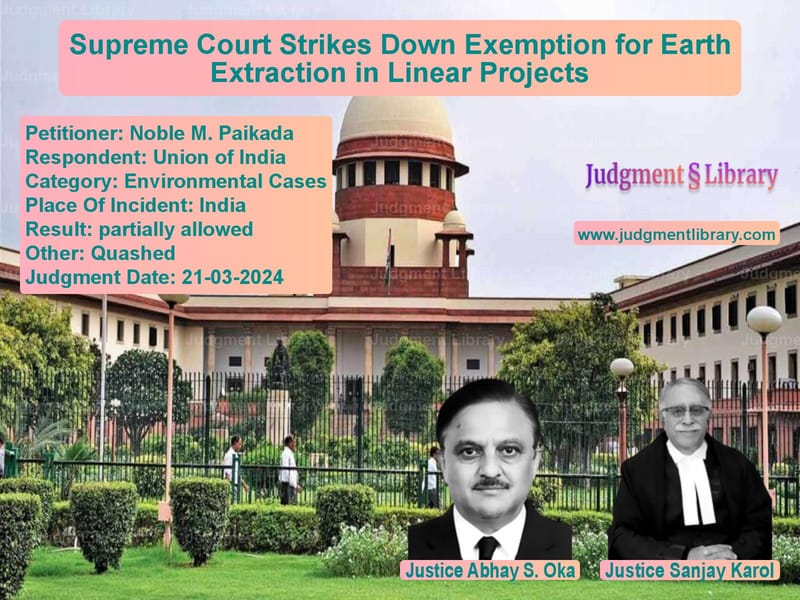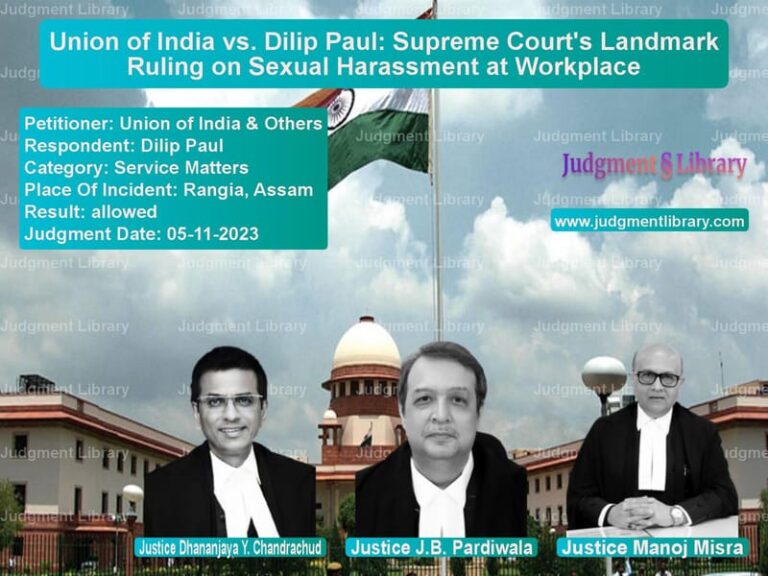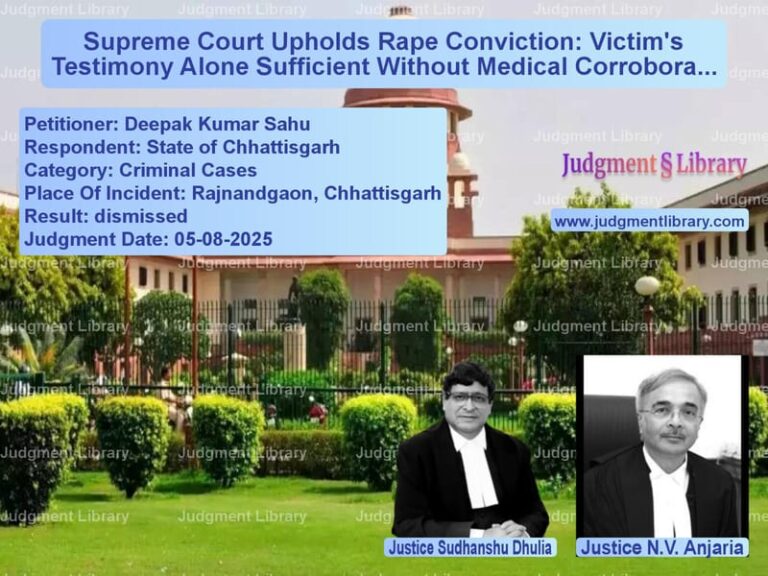Supreme Court Strikes Down Exemption for Earth Extraction in Linear Projects
The Supreme Court of India recently ruled on a significant environmental dispute in Noble M. Paikada v. Union of India, striking down an exemption granted under environmental regulations for the extraction of ordinary earth in linear projects like roads and pipelines. The case revolved around the legality of the 2020 notification issued by the Ministry of Environment, Forest and Climate Change (MoEF&CC), which exempted certain activities from requiring prior Environmental Clearance (EC).
Background of the Case
The dispute began when the MoEF&CC issued a notification on 28 March 2020, modifying environmental clearance (EC) requirements. The key issue was the insertion of a new exemption (Item 6 in Appendix-IX), which allowed the extraction or sourcing of ordinary earth for linear projects without obtaining prior EC. The appellant, Noble M. Paikada, challenged this exemption before the National Green Tribunal (NGT), arguing that it violated environmental laws and the Supreme Court’s ruling in Deepak Kumar v. State of Haryana, which required EC for even minor mineral extraction.
The NGT ruled that the exemption should not be blanket and must include safeguards. It directed the government to revisit the notification, but the appellant was dissatisfied and moved the Supreme Court.
Petitioners’ Arguments
The appellant’s counsel raised the following concerns:
- The exemption violated the Environmental Protection Act, 1986 (EP Act), which mandates strict environmental regulation.
- The MoEF&CC did not follow the procedure required under Rule 5(3) of the Environmental Protection Rules, 1986 (EP Rules), which requires public consultation before issuing such exemptions.
- The exemption contradicted the Supreme Court’s ruling in Deepak Kumar, which mandated prior EC for minor mineral extraction.
- The exemption was arbitrary, as it did not define the scope or safeguards for extraction.
Respondents’ Arguments
The Union of India defended the exemption, arguing:
- The exemption aligned with amendments made to the Mines and Minerals (Development and Regulation) Act, 1957 (MMDR Act).
- The MoEF&CC had conducted consultations with expert committees before finalizing the exemption.
- Safeguards were later introduced via the 30 August 2023 amendment, requiring compliance with standard operating procedures (SOPs).
- The decision was a policy matter and should not be interfered with by the courts.
Supreme Court’s Observations
The Supreme Court found several deficiencies in the government’s approach. The key observations included:
- Failure to follow due process: The government did not conduct public consultation before granting the exemption, violating Rule 5(3) of the EP Rules.
- Violation of Supreme Court precedent: The exemption contradicted the Deepak Kumar judgment, which required EC for minor mineral extraction.
- Arbitrary nature of the exemption: The exemption lacked clarity on the quantity of earth extraction allowed, the extent of impacted areas, and monitoring mechanisms.
Key Judicial Remarks
The Court was critical of the government’s handling of the exemption:
“The drastic decision to invoke sub-rule (4) of Rule 5 was made without any application of mind. Hence, the decision-making process has been vitiated.”
On the need for environmental safeguards, the Court observed:
“The object of the EP Act is to protect and improve the environment. Granting such blanket exemption completely defeats this purpose.”
Final Judgment
The Supreme Court ruled:
- Item 6 of the 28 March 2020 notification and the 30 August 2023 amendment were struck down.
- The exemption for extraction of ordinary earth for linear projects was declared illegal and arbitrary.
- The government must ensure compliance with prior EC requirements for such projects.
Conclusion
This ruling reinforces environmental protections and ensures that even seemingly minor resource extraction activities comply with legal safeguards. The judgment serves as a warning against bypassing due process and underscores the necessity of public participation in environmental decision-making.
Petitioner Name: Noble M. Paikada.Respondent Name: Union of India.Judgment By: Justice Abhay S. Oka, Justice Sanjay Karol.Place Of Incident: India.Judgment Date: 21-03-2024.
Don’t miss out on the full details! Download the complete judgment in PDF format below and gain valuable insights instantly!
Download Judgment: noble-m.-paikada-vs-union-of-india-supreme-court-of-india-judgment-dated-21-03-2024.pdf
Directly Download Judgment: Directly download this Judgment
See all petitions in Environmental Cases
See all petitions in Public Interest Litigation
See all petitions in Legislative Powers
See all petitions in Judgment by Abhay S. Oka
See all petitions in Judgment by Sanjay Karol
See all petitions in partially allowed
See all petitions in Quashed
See all petitions in supreme court of India judgments March 2024
See all petitions in 2024 judgments
See all posts in Environmental Cases Category
See all allowed petitions in Environmental Cases Category
See all Dismissed petitions in Environmental Cases Category
See all partially allowed petitions in Environmental Cases Category







